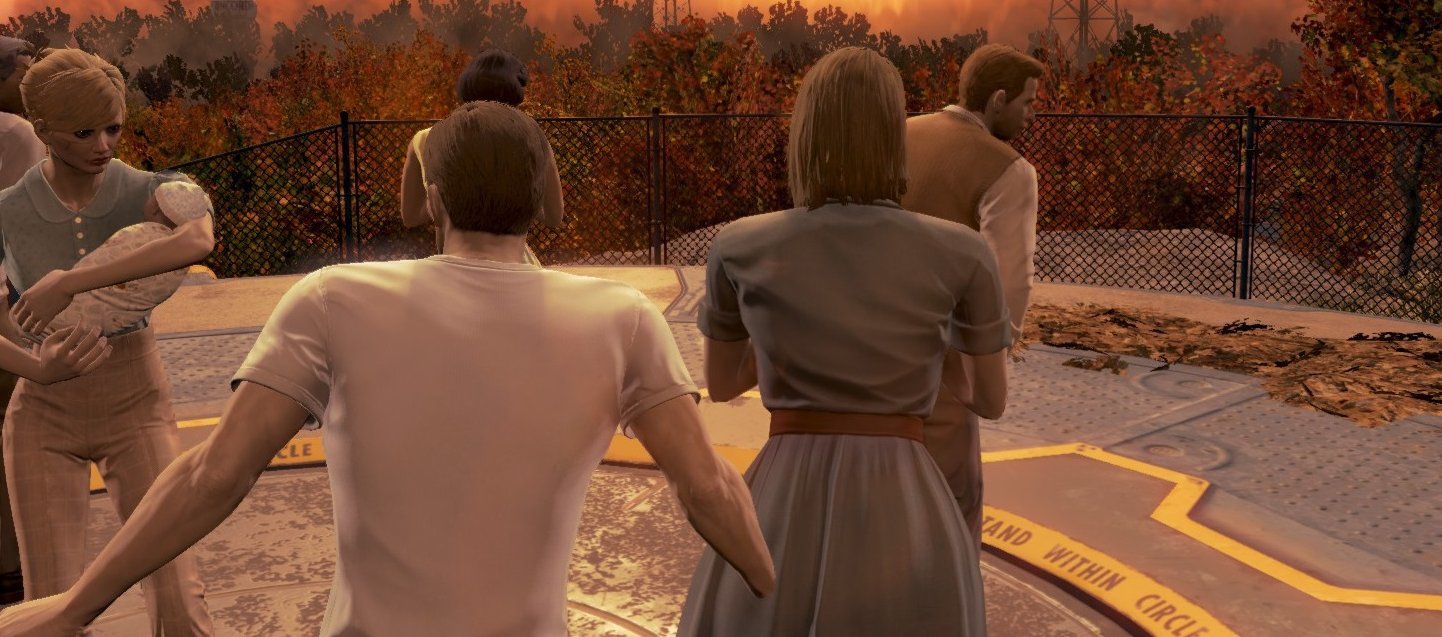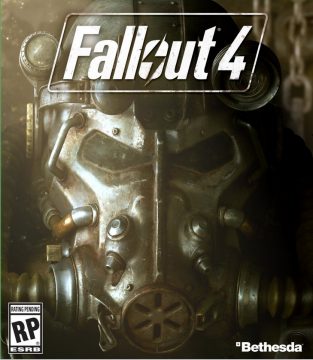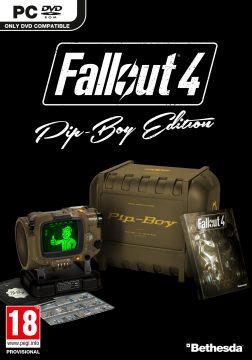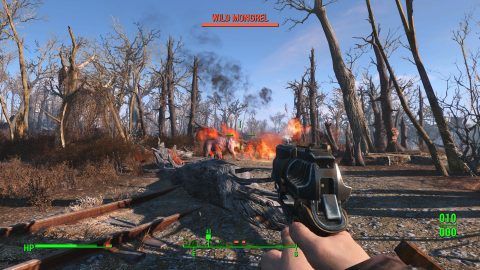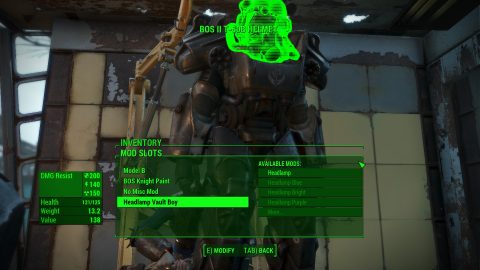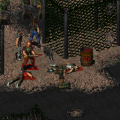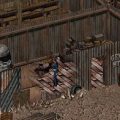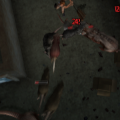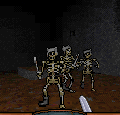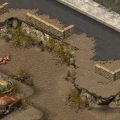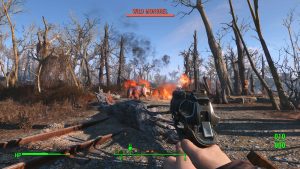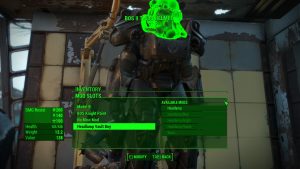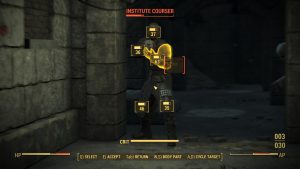In Fallout 4, armor works different than in every single Fallout game before it. This time, it’s composed of six independent pieces worn over the character’s clothes. Pieces of armor are usually bought or salvaged from enemies and as a result, you’ll rarely wear a single set, instead mixing and matching elements as you go. As for clothing, it will usually be your Vault jumpsuit as most clothing you find is inferior to it. This mechanic serves as a perfect metaphor for the game’s identity crisis: in that it has some recognizable Fallout features but they’re buried underneath unrelated elements taken from different popular games and a few mods without much rhyme or reason.
In Fallout 4, you can romance your companions and a few NPCs. Occasionally, your romantic partners will criticize you for flirting with other people but for the most part they don’t care if you cheat on them, they don’t care if you leave them and even if they care, you can regain their trust by travelling with them for about five minutes. This is another great metaphor for the game itself as it constantly flirts with different ideas but it doesn’t commit to any of them. Fallout 4 might have some feelings for Fallout 3, Fallout: New Vegas, Destiny, Borderlands, Minecraft and Mass Effect but they’re ultimately shallow and superficial.
It is temtping to call Fallout 4’s approach ‘experimental’ but in reality, it’s more like a cargo cult. The protagonist is now voiced and your dialog options are reduced to what fits on a dialog wheel but there’s absolutely no point in doing that as unlike protagonists from Witcher series or even modern Bioware games, the game’s more directed approach does not result in a strong, defined character. The protagonist is still more or less a blank state (male characters gets two or three sentences of backstory, his wife gets even less) and a limited number of choices (combined with the fact that the options given to you are often non-descriptive: you never know why your character will ‘hate newspapers’ or ‘support the news’ and ‘sarcastic’ can mean anything from a little joke to an insult) means that creating your own character based on Bethesda’s template is rather difficult.
Similarly, the game features a settlement building system that neither adds much to the game nor stands on its own. If it is there for flavor, it doesn’t really work because to build things you need to take specific perks and haul a lot of junk to your settlements which means that you’ll have to delay getting perks that will be useful for the rest of the game and you won’t use junk to get money or upgrade weapons. If it’s there to add something like an optional strategy minigame, it fails because it’s somehow even less involved than Fallout Shelter and because you will be constantly interrupted by the aforementioned need to carry junk. Settlement building had a lot of potential but it wasted it the same way trying to do it wastes player’s time.
Fallout 4 is a much better shooter than 3 or New Vegas. Weapons now have a proper recoil and their animations are more convincing, iron sights are more useful as now they actually help you with aiming instead of obstructing your view. Enemy AI is much better as your opponents are quite good at flanking, retreating, taking cover and using grenades. Unfortunately, level design in most of the quest-related indoor areas is straight out of Operation Anchorage or Mothership Zeta so improved gunplay is less of a cool feature that makes game better and more of a necessity without which you would quit the game after a few hours and never look back.
The more shooting-oriented level design is one of many examples of the game abandoning RPG mechanics. The most glaring one is the complete redesign of SPECIAL system. SPECIAL stats now don’t have much purpose beyond determining which perks you can get and they can be increased on level up. There are no skills and no skill checks (outside of occasional speech challenges, although they’re usually just for getting better quest rewards – a build focused on intelligence or charisma is now completely useless), although some of the skill-related bonuses and requirements for hacking/lockpicking minigames have been merged into perks. This, combined with the fact that perks have both stat and level requirements, means that you have much less choice in how you build your character. There’s also not much consequence to what you pick – there’s no level cap (outside of the size of unsigned short integer), you can max out your stats and perks are not mutually exclusive so given enough time and patience, you can be good at everything.
Fallout 4 features an extensive equipment modding system. It’s possible to apply many different modifications to your weapons, clothes, armor and power armor (which now works like a vehicle, needs repairs and requires fusion cores to run), improving their statistics and occasionally changing how their work (e.g. adding beam splitter to you laser musket will turn it into a shotgun-like close-to-medium range weapon). Unfortunately, just like settlement building, this requires both perks and junk which makes the whole thing much more tedious than it should have been.
There are factions in Fallout 4, although they don’t work the same way they worked in New Vegas. Instead of building up your reputation across the whole game and inevitably getting in conflict with those you didn’t pick, you can now do quests for each faction without any negative consequences. Only as the game’s main story is nearing its end you will be forced to pick a side in conflict and before that nobody will care if you collaborate with their sworn enemies. Funnily enough, if you do a quest for one faction that involves going against a different one with which you’re on friendly terms, enemies will completely ignore you (unless it’s one of those ‘point of no return quests’). If a game assigns you a temporary companion, he will do the fighting (but never die as now the game is full of ‘essential’ NPCs) while you casually walk towards quest goal.
Probably the worst new addition to the game are ‘radiant quests’: randomly generated missions created with Radiant AI (the system responsible for NPC scheduling in Gamebryo-based games). Just like in Skyrim, those quests are utterly boring extermination missions without any backstory other than ‘those guys on the other end of the map are threatening us, go kill them’. Worst of all, those quests are how you get more settlements and getting more settlements is required to get one of the factions’ ending so if you like Minutemen, prepare yourself for endless fights against ghouls and raiders.
The story of Fallout 4 begins before the nuclear war, with the player taking the role of either a retired soldier or his wife as they take care of their newborn baby. After a few minutes in retrofuturistic America, the bombs start falling and the player must run to one of the Vaults where he’ll get cryogenically hibernated for over two hundred years. During that time, player’s son gets kidnapped and all the Vault Dwellers – including player’s spouse – are killed, setting up the game’s major quest: find your child and get your revenge.
One of the first things that happen after you leave the Vault is the encounter with Minutemen faction which escalates from you helping them defeat raiders to you using a power armor and a minigun to kill a deathclaw. About half an hour later, you’re the new leader of the Minutemen as the old one prefers to repair random buildings and give you those annoying randomly generated quests. Previous Fallout titles might have been slow-paced but Fallout 4 doesn’t care about that, here you’re supposed to be amazing from the beginning to the end.
Strangely enough, the plot of Fallout 4 is not centered around anything related to the post-apocalyptic setting. People are still living in ruins but that’s a minor plot point, the game’s major theme is the question about the humanity of artificial intelligence. Two of the big factions, Institute (which creates intelligent androids – called ‘synths’ in Fallout 4 – and uses them for slave labor) and Railroad (which seeks to free the androids, even if it requires reprogramming them so they think they’re human), debuted in Blade Runner-inspired Fallout 3 quest ‘Replicated Man’ in which you either help one of Institute’s scientist catch an escaped robot or help Railroad members keep the robot hidden. Good old Brotherhood of Steel is also present, this time as a group of fanatics who want to eradicate synths. This, combined with the fact that Institute hides its shady activities behind sterile high-tech facade, brings the game closer to cyberpunk than to post-nuclear struggle for survival the series is known for. A few of the main quests distinguish themselves from the game’s usual shooting by giving you cool science fiction objectives like exploring the memories of a dead synth or building a teleportation device.
Unfortunately, while the story is not bad, the way it’s handled in-game stands against all the principles of Fallout series. There’s very little choice in Fallout 4 and the only one that actually matters is which faction you pick – and that’s stretching it as of four playable factions, three have the same ending (with a minor variation depending on whether you killed a certain character). Fallout 4 takes Fallout 3’s approach even further, with the story being given very little emphasis and the loop of exploring, fighting and looting being expanded with crafting and settlement building.
Visually, Fallout 4 differentiates itself with a less realistic and more stylized look. Colors are overstaturated, lighting and fire regularly create impressive effects (e.g. god rays) and heavily irradiated areas (Glowing Sea, as well as any outdoor area during a radiation storm) have an otherworldy green tint. The game’s violence is also much less realistic when compared to previous titles, with fountains of bright-red blood erupting from enemies’ wounds. Fallout 4 once again impresses with fantastic looking environment and this time it avoids the dull brown color schemes that plague many shooters but it also disappoints with character gestures and facial animations which look jarringly unnatural and feel slightly out of sync with the dialog.
Fallout 4’s voice acting is of generally high quality and this time isn’t hampered by poor writing. While it’s not as good as New Vegas in this regard (or in most regards), it doesn’t make you want to skip all the talking the way Fallout 3 did. Sound effects are nothing special and neither is the game’s original soundtrack but unfortunately this time the in-game radio is pretty disappointing. The game’s biggest station, Diamond City Radio, recycles many of the tracks from Fallout and the other big one – Classical Radio – while having an excellent selection of classical music might not be available (depending on the ending you get) after the main storyline is over.
From the technical standpoint, the game is quite a mess. While it has been undeniably improved since launch, the game still suffers from issues ranging from poor companion AI (your dog will walk through laser tripwires that trigger an explosion and as every companion is ‘essential’, you’ll be the only one who suffers the consequences) to random, major slowdowns in outdoor areas (on consoles, the game’s fps count can be reduced to single digits but even current gaming PCs are not immune to this problem). Like in other Gamebryo games, game speed is tied to fps count which messes up the physics if v-sync is disabled but strangely enough, unlocking fps on a good PC will also speed up the game’s annoyingly long loading screens which (given that the biggest cause of long load times is disk acces) implies that for some inexplicable reason the game is making loading artifically longer. The game also has serious flaws when it comes to usability as the inventory interface which worked well in 3 and New Vegas when you had two pieces of armor (body armor and a helmet) is extremely inconvenient when you’re dealing with clothing, five pieces of body armor, a helmet and potentially six pieces of power armor. Settlement building interface is even worse, especially with keyboard and mouse controls which the game just can’t get right as it’s inconsistent about such simple things as accepting and cancelling.
In general, Fallout 4 is not a very good game. It is similar enough to Fallout 3 to feel derivative and its attempts at innovation feel like either unsuccessful attempts at emulating other popular games or further dumbing down of RPG mechanics. It doesn’t feel like a Fallout game anymore but it’s not ‘Skyrim with guns’ either – but that’s because it doesn’t know what it wants to be. It might be a step towards procedurally generated post-apocalyptic world simulator but if it is, there’s still a very long way ahead and taking it would be a risk Bethesda is reluctant to take. As it is, Fallout 4 is too inconsistent, too undecided and neither in the spirit of older games nor innovative enough to stand on its own.
